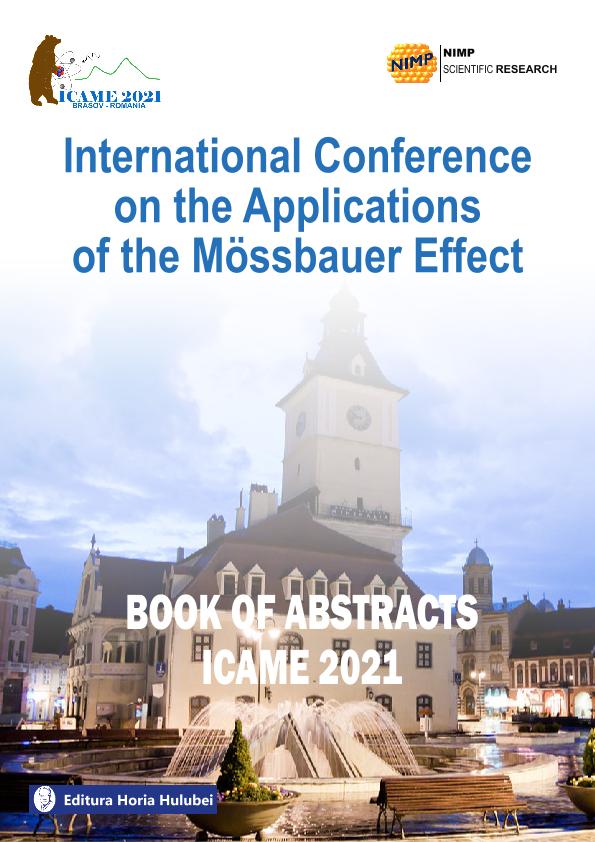Mostrar el registro sencillo del ítem
dc.contributor.author
Salcedo Rodriguez, Karen Lizeth

dc.contributor.author
Melo Quintero, Jhon Jaither

dc.contributor.author
RodrÍguez Torres, Claudia Elena

dc.contributor.author
Errico, Leonardo Antonio

dc.date.available
2023-07-07T20:35:57Z
dc.date.issued
2021
dc.identifier.citation
Ab initio study of FeAl2O4 and Fe2AlO4: Analisys of structural, magnetic and hiperfyne properties; International Conference on the Applications of the Mössbauer Effect; Brasov; Rumania; 2021; 132-132
dc.identifier.isbn
978-606-94603-3-7
dc.identifier.uri
http://hdl.handle.net/11336/202809
dc.description.abstract
Oxides with the spinel structure are of great interest in different fields. In these oxides the electronic and magnetic properties are very sensitive to structural changes or to the presence of defects such as cation inversion, scale factors, or oxygen vacancies. These defects are at the origin of the incredibly wide variety of behaviours and properties that these oxides present, making it excellent candidates for applications as photovoltaic devices, lithium-ion batteries, photocatalysis, medical applications, etc. The continuous theoretical and experimental studies of oxides with the spinel structure has allowed in the last decade great advances in the understanding of the relationship between the structural and electronic changes at the nanoscale and the underlying mechanisms which activate the observed properties.As in other systems, the properties of the spinel oxides are strongly related to the synthesis conditions. In the particular case of Al-Fe-O spinels the thermodynamical conditions are an important factor in the final atomic arrangement. Depending on Fe/Al concentration two types of spinel structures can be formed: FeAl2O4 (Fe aluminate) and Fe2AlO4 (aluminium ferrite). The objective of the present work is to study from first principles calculations the structural, electronic and magnetic properties and the hyperfine interactions at the Fe sites in both systems. The main objective is to identify the lowest energy distributions of cations in the two cationic sites of the structures and the spin configuration of each system. The comparison between the calculated hyperfine parameters at the Fe sites and 57Fe Mossbauerexperimental result will be used to confirm our structural and magnetic model for each structure. The theoretical study was carried out using the Density Functional Theory (DFT) based first-principles Full-Potential Linearized Plane-Wave (FP-LAPW) method as implemented in the code Wien2k, in the framework of the generalized gradient approximation (GGA) + U formalism. To obtain the lowest energy structures for each system different Fe and Al distributions in the cationic sites and different spin configurations were considered. The results obtained allow us an analysis of the degree inversion in both Fe-Al-O compounds, the magnetic moments and the changes in the hyperfine parameters going from the Al-ferrite to the Fe-aluminate. Our results are also compared with different experimental results reported in the literature.
dc.format
application/pdf
dc.language.iso
eng
dc.publisher
Horia Hulubei
dc.rights
info:eu-repo/semantics/openAccess
dc.rights.uri
https://creativecommons.org/licenses/by-nc-sa/2.5/ar/
dc.subject
AB INITIO CALCULATIONS
dc.subject
METAL OXIDES
dc.subject
MAGNETIC PROPERTIES
dc.subject
MOSSBAUER SPECTROSCOPY
dc.subject.classification
Física de los Materiales Condensados

dc.subject.classification
Ciencias Físicas

dc.subject.classification
CIENCIAS NATURALES Y EXACTAS

dc.title
Ab initio study of FeAl2O4 and Fe2AlO4: Analisys of structural, magnetic and hiperfyne properties
dc.type
info:eu-repo/semantics/publishedVersion
dc.type
info:eu-repo/semantics/conferenceObject
dc.type
info:ar-repo/semantics/documento de conferencia
dc.date.updated
2022-12-05T16:26:52Z
dc.journal.pagination
132-132
dc.journal.pais
Rumania

dc.journal.ciudad
Magurele
dc.description.fil
Fil: Salcedo Rodriguez, Karen Lizeth. Universidad Nacional de La Plata. Facultad de Ingeniería. Departamento de Ciencias Básicas; Argentina. Consejo Nacional de Investigaciones Científicas y Técnicas. Centro Científico Tecnológico Conicet - La Plata. Instituto de Física La Plata. Universidad Nacional de La Plata. Facultad de Ciencias Exactas. Instituto de Física La Plata; Argentina. Universidad Nacional de La Plata. Facultad de Ciencias Exactas. Departamento de Física; Argentina
dc.description.fil
Fil: Melo Quintero, Jhon Jaither. Consejo Nacional de Investigaciones Científicas y Técnicas. Centro Científico Tecnológico Conicet - La Plata. Instituto de Investigaciones Fisicoquímicas Teóricas y Aplicadas. Universidad Nacional de La Plata. Facultad de Ciencias Exactas. Instituto de Investigaciones Fisicoquímicas Teóricas y Aplicadas; Argentina. Universidad Nacional de La Plata. Facultad de Ciencias Exactas. Departamento de Física; Argentina
dc.description.fil
Fil: RodrÍguez Torres, Claudia Elena. Universidad Nacional de La Plata. Facultad de Ciencias Exactas. Departamento de Física; Argentina. Consejo Nacional de Investigaciones Científicas y Técnicas. Centro Científico Tecnológico Conicet - La Plata. Instituto de Física La Plata. Universidad Nacional de La Plata. Facultad de Ciencias Exactas. Instituto de Física La Plata; Argentina
dc.description.fil
Fil: Errico, Leonardo Antonio. Universidad Nacional del Noroeste de la Provincia de Buenos Aires. Departamento de Ciencias Básicas y Experimentales; Argentina. Consejo Nacional de Investigaciones Científicas y Técnicas. Centro Científico Tecnológico Conicet - La Plata. Instituto de Física La Plata. Universidad Nacional de La Plata. Facultad de Ciencias Exactas. Instituto de Física La Plata; Argentina. Universidad Nacional de La Plata. Facultad de Ciencias Exactas. Departamento de Física; Argentina
dc.relation.alternativeid
info:eu-repo/semantics/altIdentifier/url/https://infim.ro/ICAME-2021
dc.conicet.rol
Autor

dc.conicet.rol
Autor

dc.conicet.rol
Autor

dc.conicet.rol
Autor

dc.coverage
Internacional
dc.type.subtype
Conferencia
dc.description.nombreEvento
International Conference on the Applications of the Mössbauer Effect
dc.date.evento
2021-09-03
dc.description.ciudadEvento
Brasov
dc.description.paisEvento
Rumania

dc.type.publicacion
Book
dc.description.institucionOrganizadora
Institute of Materials Physics
dc.source.libro
International Conference on the Applications of the Mössbauer Effect
dc.date.eventoHasta
2021-09-08
dc.type
Conferencia
Archivos asociados
